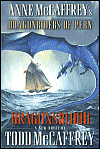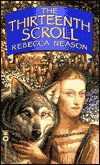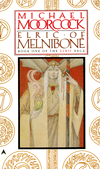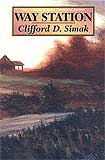
Nation, by Terry Pratchett
Book Review by SJ Higbee
This is a story of Mau, a boy returning to the Nation to celebrate his new manhood, when a huge wave washes away everyone he's ever known -- and deposits a huge boat in the middle of the devastated rainforest. How can he rebuild the Nation? And what will he do about the pale-faced girl he discovers still alive aboard the boat? Because the story is also about Daphne and her struggles to survive on an island with a boy she can't understand, when her upbringing -- at least since her grandmother moved in -- only equipped her to be a lady. Written mostly from the viewpoint of the two main characters, the story whips along at a brisk pace, with all the twists and turns you'd expect from a master storyteller blessed with Pratchett's talent and experience.
That said, it took me two goes to get into this book -- due to the aforementioned adoration I have for Pratchett's previous work. I've always used the Discworld books as a security blanket when the world got too scary -- and there isn't anything remotely cosy about the opening chapters of Nation when a bereaved and traumatised boy is dealing with the aftermath of the tsunami. Pratchett's deceptively simple writing style pulled me right into Mau's struggles to dispose of all the corpses in the appropriately respectful manner. But it was Daphne's recollection of her mother's death in childbirth that actually moved me to tears.
That said, this book is not a bleak read -- far from it. Being Pratchett, there is humour --maybe not the laugh-aloud moments that peppered the likes of Moving Pictures and Hogfather, but some of the misunderstandings that arise between Mau and Daphne before they learn to communicate are funny enough to raise a chuckle. And for me, that alone is a rarity -- the last time I both laughed and cried over the same book was Grant Naylor's Fat.
So, apart from a gripping adventurous story, two charismatic characters, moments of emotion and humour, what else has this book got to offer? And yes -- I know that most authors would give their eye teeth and right leg to produce work that included all those elements, never mind anything else. But this is the Great Man we're talking about -- at the height of his writing powers. Set in Victorian-ish times, the world is recognisably our own... almost. So while the insular smugness of Daphne's grandmother and the rough sailors are familiar from a dozen novels of the era, Pratchett has added original touches, such as the land octopus and a plague sweeping Britain.
However, it's the ideas bubbling within that the book that sets it apart. Pratchett explores the notion of nationhood. If a disaster has wiped out the population of your country, how do you set about establishing a shared sense of identity among the handful of bereft survivors? What defines a successful nation, anyway? He also looks at the concept of good and evil within people. How does a sense of what you were impact on what you are, or want to be? Why do people decide to be leaders? Does a good leader only have to be stronger than any challenger -- and if not, what other qualities must they possess? Are people born evil? He examines death and the idea of an afterlife. What is the best way to honour those who have died? How can we grieve and yet continue our daily lives? And for the few issues, I've mentioned, there are at least as many I haven't.
For reasons best known to themselves, Doubleday saw fit to publish this as a children's book. Don't be put off by that. I've read everything he has written (including Where's My Cow) and this is right up there with the best of it. If I had my way, this book would be prescribed reading for every Member of Parliament in the country. And if our children do read it and seriously consider only half the themes running through the book, then the next generation stands a chance of making a better job of nation-building than we have.
|
Click here to buy Nation, by Terry Pratchett on Amazon
|
Nation, by Terry Pratchett on Amazon

| More Books You Might Like |




